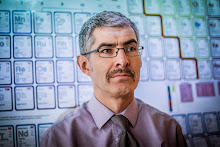I have to remind myself that the driver of this bus loves his life as much as I mine. Perhaps more. And besides, no one wants to die on this Christmas Eve. There is too much joy and beauty in the eyes of the children this day, reflecting their blissful recess from school lessons or the longing that they had school lessons to recede from.
The driver is a madman, a demon, and his conductor a high-speed trapeze artist, dangling from the ladder to the roof of the bus, Technicolor baggage in one hand, his life in the other, delighting the passengers and distracting them from the diablo driving us, hurtling, into the ground from the highland sky at our backs. The ride is punishing, my organs and fascia rolfed back to youthful vitality by the seats of the erstwhile “Bluebird”. This bus may well have carried me to school-mandated swimming lessons.
We rocket past the roadside internment camps, scattering the bright-eyed inmates roadside, arms waving in frantic greeting and desperate plea to be taken from the Inter-Americana, anywhere. We couldn’t stop, not on Christmas Eve. For now, they must commend themselves back to the care of Frente Republicano Guatemalteco, back into the “blue fist”, sanguine and still warm from the killing. These people are too beautiful to live in this beautiful land.
The razor cut, in the rigors of pomade, the Alfred E. Newman ears, all lend an air of absurdity to the driver. In the rear-view mirror I face his upturned eyebrows, but not the mouth. I variously imagine the lips spread wide, Grinch-like, as we are conveyed, from on high to certain perdition below in Guatemala City. Or, stretched tight, dry, the lips are fixed in concentration on the correct balance of air, asbestos, gravity and friction. He is alien to me, as are the epicanthal folds and the burbling tongues that surround me that evoke an origin somewhere between Yupik and Athapaskan. These are the people who crossed the Bering Strait or landed from another star. They are gods and we are the extranjeros, the profane.
The chicos, capped with Nike and the gringos frocked with green-fatigued images of Ché, longing each for the other’s utopic myth, one the crisp, crystalline air of the highland, the other the climate control of a big-box mall. Sisters, a pair, beautifully strange and beatific, take the seat before mine. Priestesses of this outland, asserting their propriety in their bearing, regaled in the garish blues, purples, reds and pinks of their office, they banter openly a secret in a tongue 25,000 years old. My world has barely impinged upon them, a golden cross hanging about their necks and nothing more, until one reaches inside her tunic to answer her cell phone. The language has survived but the telepathy has not.
We stop for gas at the Esso station in Iximché, the “place of the maize tree”. The motor runs, sputters and then stops. The imp and the acrobat scramble to lay hands on the venerable Chev 350, V-8, that has carried us this far. Everyone says a silent prayer in his own tongue that we will be delivered safely and punctually to the city, most to family and me to the airport. Beneath the corporate branding, this place is sacred. These people resent being a tourist attraction. The high priestesses can’t bring down the placards promising “whiter whites” or effective representation, nor do they wish to topple the cell phone towers of Babel. The President of the United States too thought it necessary to pass this way only nine months ago. When they finish exorcising his profanity they will begin with mine.
© 2008 Kenneth Hoffman
Subscribe to:
Post Comments (Atom)




No comments:
Post a Comment